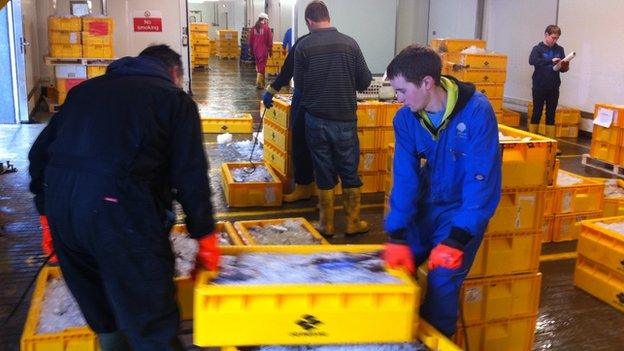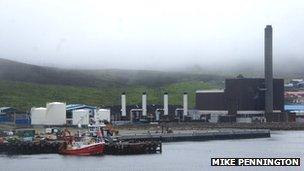Shetland sets sail for new horizons
- Published

Shetland Islands Council estimates that seafood is worth £340m a year to the economy
Shetland's tourism sector is rather niche. It's for people who like going a long way off the beaten track, and don't mind uncertain weather or the risk of being fogbound.
There's another problem this year. Shetland's very busy. I've just been there, and a hotel room costs much the same as a rather more modern room in central London.
It's not hard to see why. There's a lot of work on at Sullom Voe. Lerwick Harbour has five old cruise liners and floatels, housing more than 1,000 workers, who head 25 miles north each day to build a new gas plant for Total.
There are many other workers at the plant living around Shetland. And while Total's work should be finished later this year, the next stage is for BP to start building its "gas sweetening" plant - processing gas from its west of Shetland fields.
After that is the replacement for Lerwick's power station, which is reaching the end of its oil-based consents.
It's all part of the boom, and next boom, in the Shetland economy. It's become quite smart at avoiding the busts and troughs.

Lerwick Power Station will be replaced in due course
In the longer term, Dutch-owned Peterson, in the marine logistics business, is seeking orders for its decommissioning pad - a large chunk of quayside capacity at the north end of Lerwick Harbour.
It's got 120 people skilled up to deal with all the toxic, dirty nasties that will come ashore with those jackets, topsides, rigs and pipelines, with more than 90% recycling potential.
But the decommissioning boom - more than £30bn of business over 30 to 40 years - keeps moving off into the distance. Peterson is keeping busy, meantime, as a supply base for all that new activity east and west of Shetland, which it may be decommissioning in four or five decades.
Shetland is well placed for decommissioning, but it's pricey, and there are others gearing up to compete. Teesside is already winning early contracts. There are prospects also for Aberdeen, Montrose and Dundee, with capacity also at Nigg in Easter Ross, and Ardersier, near Inverness, could be opened up again.
Norway is also gearing up for this work, which will be a formidable competitor despite its very high labour costs.
'Soothmoothers'
The message I picked up clearly from Shetland was that us soothmoothers shouldn't forget that seafood is much more important than oil and gas. Alastair Cooper, convener of economic development at Shetland Islands Council, told me that oil and gas earns £45m a year, while seafood is worth £340m.
Farmed salmon dominates that, but I was astonished at the scale of mussel farming - more than 4,000 tonnes a year, and more than two-thirds of Scottish mussel production.
While there have been complaints at the new deal struck with the Faroes Islands' pelagic fleet (mackerel and herring to most of us), it looks like an odd problem for the Shetland boats.
Their quota this year is up by more than 80%. That means they have to find expanded markets, which may be tricky given that key markets include Russia and Ukraine.
The problem is that it's a fixed percentage of total quotas, so if the total falls, they'll find the numbers falling. And those vast pelagic boats tied up at Shetland quaysides would be stuck there even longer.
Renewable energy
The other long-term hope for Shetland, to sustain it after the series of oil booms run out, is renewable energy. You can quickly see there's a lot of it about. I'm told there's a wind turbine just north of Lerwick which is the most efficient in Europe.
And while Shetland has had a big local controversy recently about whether to build between 100 and 150 turbines in the central mainland, which is still facing a court challenge, it's all beginning to look a bit academic if there's no interconnector linking to the Scottish mainland.
That's the consequence of the diminishing appetite among the public, as bill-payers, and their Westminster representatives.
You can hear more about the Shetland economy on Business Scotland, including a look at its micro-businesses and a company that's combining traditional music with micro-electronics research on BBC Radio Scotland at 10am on Sunday 6 April, and after that by free download and on BBC iPlayer.